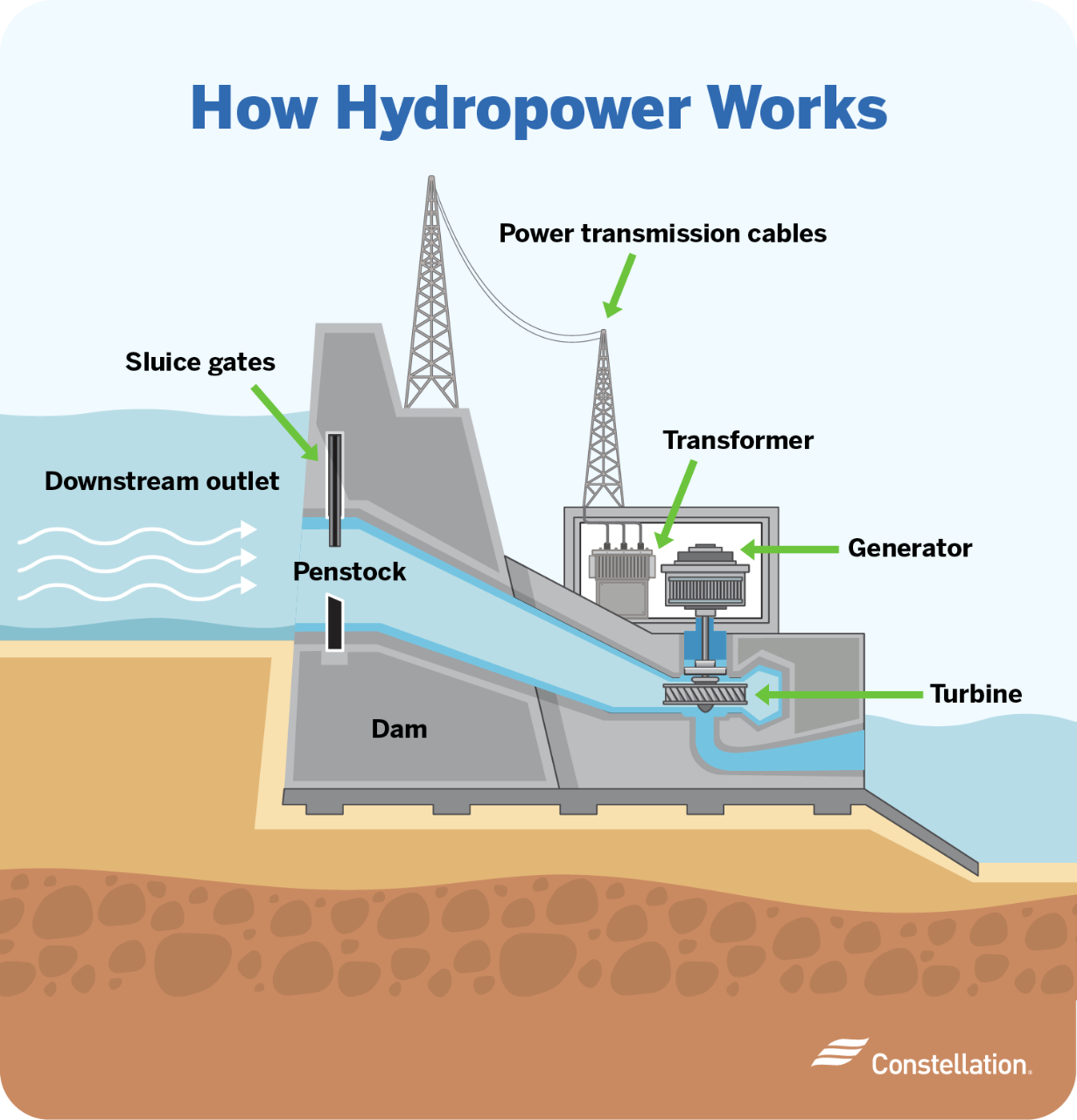What Is Hydropower?
- Home Page
- Energy 101: Resources to Help Understand Energy
- Energy Innovation
- What Is Hydropower?
With so much attention now being given to renewable energy, you may wonder: What is hydropower? And is hydropower renewable?
Hydropower is electricity generated by the flow of water. Where hydropower comes from is a process where water creates kinetic energy when it flows downhill. That energy turns turbines that power a generator to produce electricity.
In answer to the question, is hydropower renewable -- yes. Hydropower is a renewable energy source because it does not burn fossil fuels. It produces no greenhouse gasses, so it is also clean energy. Unlike wind and solar, water doesn’t stop flowing at night or during calm weather.
It is not only one of the oldest, but is also among the most reliable types of renewable energy sources.
Hydropower provides 6.3 percent of the electricity used in the United States, according to the U.S. Department of Energy, playing an important role in powering the country and reducing emissions.
How does hydropower work?

The history of hydropower goes back thousands of years. Modern hydropower uses old principles. Water in a high place flows to a low place over a turbine, causing it to spin and power a generator. The flow can be natural, like Niagara Falls or it can be engineered.
In most cases, building a dam creates a reservoir. Water flowing from the reservoir through the dam pushes against turbines, causing them to spin. The turbines connect to a generator through a series of shafts and gears that turn the mechanical energy into electricity. Transmission lines deliver electricity to homes and businesses.
How is hydropower used? In most cases, it generates electricity. Because hydropower is clean, plentiful and low cost, the uses of hydropower include many power-hungry industries. Another answer for the question: What is hydropower used for, is to balance the load on the grid during high demand periods and to even out power generated by intermittent energy sources like wind and solar.
Types of hydropower plants
When talking about hydropower, you are really talking about several different types of hydropower technologies.
Impoundment
An impoundment hydropower plant is a fancy way of saying that a river has been dammed to create a reservoir. Water from the reservoir enters the plant from intakes that channel it through a penstock, essentially a tunnel through the dam that sends the water over turbines. The turbines spin to power a generator that creates electricity. Electricity from the plant flows out to customers via transmission lines.
Diversion
In a diversion hydropower plant, some water from a river is diverted into a canal to the power plant. So-called run-of-the-river plants have a much smaller impact on ecosystems and the environment. From the canal, water flows through a penstock into a powerhouse. There it turns turbines to power generators. Electricity flows to customers over transmission wires and water then flows back into the river.
Pumped Storage
These facilities include a reservoir at a higher elevation and a water source at a lower elevation. It works with a series of pumps. During times of low power demand, water is pumped from the lower reservoir to the upper. When customers need more power, the system reverses, sending water down to the turbines. This approach balances the load on the grid and can be a cost-efficient way to use available resources.
Cost of hydroelectric power
The cost of hydropower is comparatively low. Because it uses a renewable source of energy, flowing water, hydropower plants do not have to factor fuel costs into their prices.
The main costs to produce hydroelectric power are constructing the facility and then maintaining it. Maintenance costs can be relatively low for properly constructed facilities, and the plants can last for last decades or longer. Some hydro plants are already operating into their second century. States that get much of their electricity from hydropower, such as Idaho, Washington, and Oregon, have some of the lowest electricity bills in the United States.
History of hydroelectric power
Water wheels have been powering activities from grinding grain to making paper for thousands of years.
Hydropower technology took a leap forward in the early 1800s when French and English inventors separately developed advances in turbine engineering. The first workable hydroelectric system was a home project built in Northumberland in 1878. A few years later, a company in Wisconsin opened the first commercial hydroelectric plant.
In the 1880s, more plants opened in the Great Lakes area to supply electricity to factories and businesses. The first hydroelectric plant at Niagara Falls opened in 1895. Ten additional facilities were built there over time, the last one being the Robert Moses Niagara Hydroelectric Power Station completed in 1961. It includes a pumped storage facility, in addition to the diversion facility.
New Deal government spending funded the Hoover Dam, completed in 1936, and the Grand Coulee Dam, completed in 1942. More impoundment facilities were built during the 1940s through the 1970s to support first the war efforts and then population growth.
The U.S. is home to roughly 1,450 conventional hydroelectric plants. The largest of these is the Grand Coulee Dam across the Columbia River in Washington state. It has the capacity to generate 6,809 megawatts of electricity a year. The oldest hydropower plant is the Whiting Hydroelectric Project built in Portage County that opened in 1891. In total, the United States currently has the hydroelectric capacity to produce 101.9 gigawatts of energy.
Renewable energy plans from Constellation
Renewable energy is an important component of our strategy for serving your power needs. We invest in a mix of technologies and continue to support ways to bring reliable, clean energy to our customers. We invite you to explore residential renewable plans in your area.
For additional tips on how to conserve natural resources and save energy, visit our home energy savings library of articles.